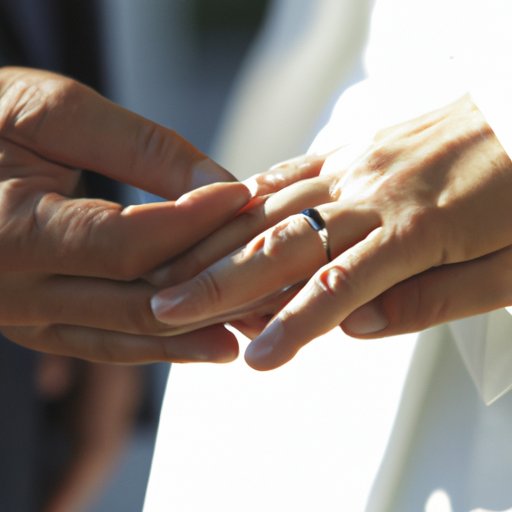Introduction
Marriage is a universal institution that has been around since the dawn of civilization. In modern times, it is still a major milestone in many people’s lives, but the timing of when people choose to get married has changed over the years. This article will explore the various trends, societal expectations, and reasons behind couples’ choices to marry early or late. It will also compare the average age of marriage across different cultures.

Analyzing Trends in the Age of Marriage
Historically, most people got married in their twenties, with the median age for men being 26 and for women being 22. This was due to a combination of traditional expectations, as well as financial considerations. As women became increasingly independent, however, the median age of first marriages began to rise. In 2018, the median age for first marriage was 29 for men and 27 for women, according to data from the U.S. Census Bureau.

Examining Societal Expectations for Marital Timing
Societal expectations play a large role in determining when people choose to get married. Traditionally, it was expected that people would get married relatively young, usually after they had completed their education and were financially stable. This was mainly due to the fact that marriage was seen as a way to secure financial stability, as well as a way to start a family.
In recent years, however, societal expectations have shifted. While marriage is still seen as an important milestone, there is less pressure to get married at a certain age. This is partly due to the fact that many people are now delaying marriage in order to focus on their career and personal goals. This shift has led to an increase in the median age of first marriage, as more people are choosing to wait until they feel ready before taking the plunge.
Investigating the Reasons Behind Couples’ Choices to Marry Early or Late
There are a variety of factors that can influence a couple’s decision to get married early or late. Financial considerations are often a major factor, as getting married earlier can provide a sense of security and stability. In addition, social pressures can also play a role, as some couples may feel pressured to get married in order to conform to societal expectations.
On the other hand, some couples may choose to delay marriage in order to focus on their personal goals and aspirations. This could be anything from pursuing a degree or career, to travelling or simply enjoying life without the responsibilities of marriage. Ultimately, the decision to marry early or late is a deeply personal one that should be based on what feels right for each individual couple.

Exploring the Pros and Cons of Getting Married at Different Ages
Getting married at any age comes with both advantages and disadvantages. For those who marry young, there are pros such as having more time to build a life together, as well as being able to enjoy the prime of their lives as a couple. On the other hand, marrying young can also come with drawbacks such as decreased financial stability and an increased risk of divorce.
Marrying later in life can also come with pros and cons. The main advantage is that couples have more time to pursue their own goals and interests before settling down, which can lead to a stronger relationship in the long run. However, there are also disadvantages such as missing out on the opportunity to experience life as a couple during the prime of their lives.
Comparing the Average Age of Marriage Across Cultures
The average age of marriage varies significantly across cultures. In the United States, the median age of first marriage is around 28-29 for men and 27 for women. In other countries, however, the median age of marriage can be much higher or lower. For example, in India the median age of first marriage is 22 for men and 18 for women, while in Japan it is 31 for men and 29 for women.
These differences in the average age of marriage can be attributed to a variety of factors, such as cultural norms, economic conditions, religious beliefs, and government policies. Ultimately, each culture has its own set of expectations and beliefs regarding marriage, which affect the age at which most people choose to get married.
Conclusion
In conclusion, the age at which people choose to get married is affected by a variety of factors, including historical traditions, societal expectations, and personal goals. The median age of first marriage has been increasing in recent years, although it still varies significantly across cultures. Ultimately, couples should be mindful of the pros and cons of getting married at different ages, and make sure that they are ready and willing to commit before taking the plunge.


